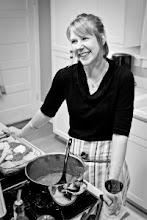
I thought I was done writing about pie.
Last weekend I was chatting with my mom on our usual Sunday evening phone call. She told me she'd been reading my blog. "Your pie looked good!" she said.
Then, she said something that made me laugh. At first.
"Susan says Grandma used Jell-O in her pie."
My mom must have been talking with her sister about the pie, when Susan mentioned that she was sure their grandmother, Grandma Peach, didn't make her custard from scratch, taking some help from Jell-O, the gelatin mix that has been helping home cooks since the late 1800s.
This really should come as no surprise. The 1950s were a roaring time for the powdered gelatin. And although I do not know it for fact, I also imagine that decade as the time when Grandma Peach began making pies. In the early 1940s, she and her husband operated a gas station in tiny Seminole, Oklahoma. As World War II rations set in and business dried out, Peach and Ira Wilson drove to Portland, Oregon, on their own gas rations. There, they took jobs in the Kaiser Shipyards, working not far from where we live today. Peach welded in the keel of huge ships. Ira, whose arthritis afforded him civilian status, managed welding rods and supplies. The tiny trailer they lived in near Gresham surely lacked counter space much as Peach likely lacked the energy.
So, it makes sense -- in my mind at least -- that the post-war era was a time for Peach to use Jell-O. Smart ad execs pushed a Jell-O campaign that touted the product as the "Busy Day Dessert" on television shows such hosted by the likes of Roy Rogers, Red Buttons and Bob Hope.
And days were busy for Peach, who was then in her 30s. She and Ira returned to their small Oklahoma home after a year and a half of hard work and a hard life in Oregon where my grandmother remembered being treated as a second-class citizen -- not only the daughter of poor shipyard parents but an Okie, too.
Back in Oklahoma, Peach and Ira spent their days at the gas station where my mother remembers playing as a young girl. The tiny brick building's floors were covered in sawdust and then swept up to absorb the greasy pools, my mom recalls. The work was dirty, the days were surely long. But long days of tough labor were as much a part of Peach's routine as afternoons in the kitchen were to other women of her generation.
Grandma Peach was a good cook -- a result of years of practice feeding a family and not a passion for the science or art of cooking. She likely knew that using Jell-O in her pie produced consistent, good results. A recipe with such promises was certainly one to repeat.
I do not know if she ever even made the lemon meringue pie with a true egg custard. Either way, she probably didn't know why the custard was difficult, only that the Jell-O made it easy. The custard must be slowly heated to kill an enzyme in the yolks that can cause a soupy mess instead of a soft, firm lemony mass that cuts with a knife. The gelatin in the Jell-O recipe skips the eggs entirely, providing structure to the corn starch and sugar ooze.
Writing this now makes me realize all the more that the Jell-O isn't a bad idea. It's practical. It's good, and it frees up your afternoon to drink a beer in the back yard or blog about last night's dinner or, in the case of women such as Peach, a little time to hang laundry on the line.
So talking about it now doesn't make my heart sink as it did when my mom uttered the "J" word. And to be honest, I'm glad I didn't know before. It gave me the drive to make the pie from scratch. I thought I needed some great from-scratch cook in my past to justify my own infatuation with food. I was searching for a connection to Peach, and for a split second I thought that connection was crushed.
I will make the pie again. I think I'll chance the soupy mess with the egg yolks even though I've been given a free Jell-O pass.
Perhaps what I inherited from my great grandmother was the tenacity of her work ethic.


No comments:
Post a Comment